Thursday Feb 19, 2026
Thursday Feb 19, 2026
Wednesday, 23 March 2022 00:00 - - {{hitsCtrl.values.hits}}

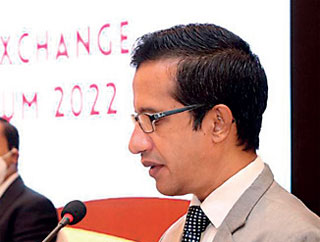
Supreme Court Justice Janak De Silva
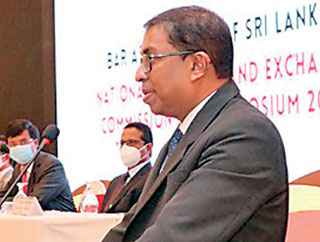
BASL President Saliya Peiris PC
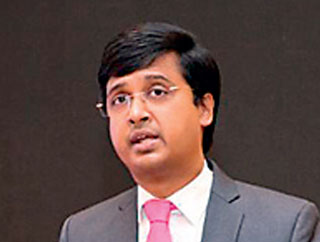
BASL Secretary Rajeev Amarasuriya
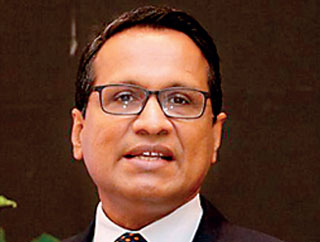
SEC Sri Lanka Chairman Viraj Dayaratne PC

Panel discussion on ‘Impact of the new SEC Act on Listed Companies and Issuers’

Panel discussion on ‘Understanding the new regime on Market Offences and its practical impact’

Panel discussion on ‘Key changes applicable to Market Institutions and Market Intermediaries’
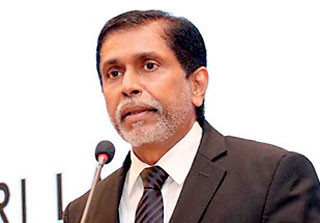 |
| CSE Chief Regulatory Officer Renuke Wijayawardhane Attorney-at-Law |
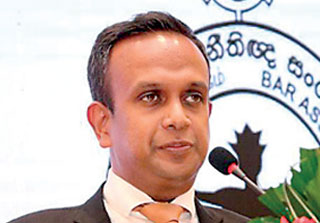 |
| Closing remarks by BASL Assistant Secretary Pasindu Silva
|
The First National Securities and Exchange Commission Law Symposium of the Bar Association of Sri Lanka (BASL) was successfully held on 16 March, at the Ballroom of the Galadari Hotel.
BASL Secretary Rajeev Amarasuriya delivered the opening remarks emphasising the relevance of the Securities and Exchange Commission of Sri Lanka Act No. 19 of 2021 (SEC) in terms of Sri Lanka's current and future securities market demands.
He went on to state that this new piece of legislation also has a number of critical measures that will help to develop, maintain, and regulate a fair, orderly, efficient, and transparent securities market. Maintaining high professional standards and providing professional services in the securities market would help to protect both international and domestic investors' interests, Amarasuriya further stressed.
BASL President Saliya Peiris PC, thereafter, addressed the gathering and stated that the concept for this Symposium stemmed from the recently enacted the SEC Sri Lanka Act No. 19 of 2021.
He continued by stating that the evolution of law has an impact on many aspects of society.
He further stated that the strength and independence of the institutions tasked with enforcing the laws will ultimately determine their success, whereas the state can present excellent laws, but it is critical to preserve the rule of law when implementing such legislation.
Peiris also praised Amarasuriya, who is relinquishing as the BASL Secretary on 26 March, for his remarkable service rendered towards BASL.
Keynote Address on “Evolution of Stock Exchange and Capital Markets: Legal Challenges”
The Keynote Address was delivered by the Chief Guest Supreme Court Judge His Lordship Justice Janak De Silva on the topic of “Evolution of Stock Exchange and Capital Markets: Legal Challenges”.
Justice De Silva's Keynote Address focused on the evolution of capital markets, particularly stock exchanges, and the development of the Securities Exchange Law, which set the stage for a better understanding of the principles and provisions which are included in the new Act.
He also highlighted several challenges for policymakers and regulators in the future, which were further discussed during the Symposium.
Justice De Silva defined a capital market as a financial market where one finds buyers and sellers dealing in different types of assets.
Financial securities and derivatives, such as stocks and bonds, as well as raw materials, are examples of assets in the financial markets.
It is stated that capital markets often supply long-term capital to businesses and governments through investors and Stock Exchange is a sub-division of capital markets.
The Bank of England issued the first formal sovereign bond issued by a national government in 1693 to generate funds for a war against France.
The first Sovereign Treasury Bond, known as the Liberty Loan, was issued in 1917 in the United States as a way to fund the United States' participation in World War I and the Allied war effort in Europe.
In terms of Stock Exchange Law, there was hardly any legal system to be found initially.
However, stock exchange laws were subsequently developed and strengthened around the world, Justice De Silva stressed.
Justice De Silva identified the foremost challenge in respect of Stock Markets as the necessity of upholding the Rule of Law at all times, in particular as a Regulator.
In the Rule of Law, the law should be applied to all equally. Every stakeholder should be subjected to the same regime and laws should be implemented for all offenders.
In this context, in Lanka Securities Ltd. vs Colombo Stock Exchange and Others (CA Writ Application No. 325/2019), Justice De Silva held that the Colombo Stock Exchange (CSE) is performing public duties and as such, is subject to Judicial Review.
Furthermore, Justice De Silva identified the second challenge as the demutualisation of the Stock Exchange.
He further stated that in demutualisation, the key challenge is how to balance the members’ interest with that of the public interest of the investors and issuers. Justice De Silva further identified ‘Derivative Trading’ and ‘High-Frequency Trading’ as further stock market challenges.
Presentation on Overview of the new SEC Act
The first presentation was conducted by the SEC Sri Lanka Chairman Viraj Dayaratne, PC who provided an overview of the SEC Sri Lanka Act No. 19 of 2021, including, key features, objectives, enforcement, and penalties.
The presentation included the effective regulation and market development, Market Institutions, market intermediaries and supplementary service providers, protection of the interests of clients and maintenance of good corporate governance, main market offenses, Criminal Proceedings, and Civil Proceedings, Agreement in lieu of Court proceedings and Administrative Sanctions, Investor protection and meaningful regulation, development of the capital market and checks and balances on powers and discretion of the Commission.
Dayaratne further emphasised that it is expected that the progressive provisions of the new Act will make sure that all market participants have the confidence and the necessary environment to engage in their activities which is the ultimate goal of the capital market.
Furthermore, he stated that the commissioner as the regulator of the market will have to at all times be aware of the perils of over-regulation and therefore, be committed to striking the right balance.
At the same time, it was emphasised that if all market participants practice self-regulation and act within the confines of the law, there will be no necessity for most of the provisions contained in the law to be made use of.
Panel discussion on ‘How the new Act facilitates the development of the capital market?’
Thereafter, an interesting panel discussion was conducted on ‘How the new Act facilitates the development of the capital market?’ which included Dayaratne PC, SEC Sri Lanka Commissioner Manil Jayasinghe, CSE Director Suren De Silva AAL, CSE CEO Rajeeva Bandaranaike, and the session was moderated by SEC Former Commissioner Rajeev Amarasuriya AAL.
New enforcement mechanisms to the SEC that can be applied in the event of identified market offenses set out in the Act, new Rules and Regulations applicable to different segments of regulated entities to facilitate the provisions of the new Act, new responsibilities cast upon the Auditors of listed companies and market intermediaries as well as Market Institutions, the role of the directors in respect of Market Institutions, from the perspective of governance and acting in the public interest, CSE’s role in ensuring investor protection and facilitation of growth of CSE and other Market Institutions were emphasised in the Panel discussion.
A member of the audience questioned if digital currencies fall within the scope of the Act as Securities and in response, it was explained that the digital currencies have not been included in the present Act.
Presentation on Market Institutions and Market Intermediaries
The Panel discussion was then followed by a presentation by CSE Chief Regulatory Officer Renuke Wijayawardhane AAL. He spoke on salient provisions applicable to Market Institutions and market intermediaries.
It was stated that promoting a fair, orderly, transparent, and efficient securities market in Sri Lanka; enhancing effective and efficient functioning of the securities market, and mitigating systematic risk associated with securities markets are the foremost objectives and purposes of Market Institutions.
He went on to explain the salient provisions in respect of Exchanges, Clearing Houses, and Depositories. As the general provisions which are applicable for Market Institutions, he elaborated on rules, power of Court to order observance, enforcement of rules, control of substantial shareholders, the appointment of directors, CEO and CRO, Annual Report and duties of an Auditor.
In respect of salient features relating to Market Intermediaries, Wijayawardhane explained the prohibition against holding out as a market intermediary, the requirement to be licensed with the Commission, instances where granting of a license may be refused, grounds for refusal of a license, and cancellation or suspension of a license.
Panel discussion on key changes applicable to Market Institutions and Intermediaries
Following the presentation, a panel discussion on Key changes applicable to Market Institutions and Market Intermediaries was held with a panel of Wijayawardhane, Union Bank Director and SEC Former Commissioner Dilshani Wijewardena, AAL, - Nithya Partners Senior Partner Naomal Goonewardene AAL, Capital Alliance Holdings Ltd. Managing Director Ajith Fernando, and the discussion was moderated by DL and F De Saram Partner Aloka Nandasena AAL
Wijayawardhane emphasised that a fair market should be provided, and it is the duty of the Stock Exchange to provide equal access to information to all the parties involved in Stock Market transactions. He further demonstrated that the CSE should consider both the interests of the Public and Investors. Goonewardene went on to explain that placing too much pressure on Auditors in respect to this Act could lead to resentment and that the SEC, as the regulator, should be cautious of putting too much pressure on business entities and auditors. The Regulatory aspect of Market Institutions and Market Intermediaries was discussed by Wijewardena, and Fernando elaborated on the benefits of the new Act for larger organisations whilst highlighting the potential detrimental impact on small and medium-sized businesses.
Panel discussion on the impact of the new SEC Act on Listed Companies and Issuers
The next panel discussion was conducted on ‘impact of the new SEC Act on Listed Companies and Issuers’ with a panel comprising of Dr. Harsha Cabral PC, Harsha Amarasekara PC, FJ, and G De Saram Senior Partner Ayomi Aluwihare AAL, John Keells Holdings PLC President Head of Legal and Secretarial Nadija Tambiah AAL and the Secession was moderated by CSE Regulatory Policy and Compliance Vice President Lankesha Molligoda AAL.
Under this new Act, every listed public company's Board of Directors must ensure that the company and its directors continue to comply with the rules and requirements of the exchange on which it is listed for as long as the firm is listed on the Stock Exchange.
Further, it was stated that a listed public company's Directors or CEO must meet the Commission's fit and proper criteria, which are set forth in its regulations or the rules of an exchange approved by the Commission.
It has also been suggested that the Chairman and CEO positions be separated, with no one person being able to hold both positions.
The importance of periodic disclosures, such as Annual Reports, and continuous disclosures, such as share price information, were also addressed. The difference between past share allocations and new allocations was also discussed in the context of an Initial Public Offering (IPO).
Panel discussion on understanding the new regime on Market Offences and its practical impact
The concluding panel discussion was on ‘understanding the new regime on Market Offences and its practical impact’ which included Heritage Partners Senior Partner Dr. Arittha Wickramanayake AAL, CSE Director and Dispute Resolution Committee Former Chairman Hiran De Alwis AAL, SEC Director Legal Ayanthi Abeywickrema AAL, LOLC Holdings PLC COO Kithsiri Gunawardena AAL, which was moderated by Counsel Heritage Partners and Former Senior State Counsel Suren Gnanaraj AAL.
During the discussion, it was noted that there are five Prohibited Conduct offenses that have been identified. False trading and market rigging, stock market manipulation, making false or misleading statements, fraudulently inducing persons to deal in Securities and use of manipulative and deceptive devices are all forms of these offenses.
It was further stated that Insider trading also has been prohibited under Part V, Chapter two of the SEC Sri Lanka Act No. 19 of 2021.
It was further pointed out that, unlike the previous Act where charges were to be filed in the Magistrate’s Court, henceforth, these Main Market Offences enumerated under Part V of the Act are to be tried in the High Court.
The panel also elaborated on the new feature that has been introduced by the new Act where the discretion is conferred on the SEC to institute civil proceedings in the High Court exercising civil jurisdiction (Commercial High Court) in order to recover damages and to seek the imposition of a civil penalty.
The practical aspects of the imposition of fines and criminal sanctions, the wide discretion conferred upon the Commission in respect of these offenses, were also discussed during the panel discussion.
BASL Assistant Secretary Pasindu Silva delivered the closing remarks and wrapped up the Symposium.
The CSE was the Principal with Daily FT as the official newspaper, and Newsfirst was the Electronic Media Partner.